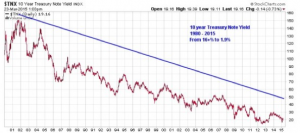After years of interventions in foreign currency markets to hold back market forces, China’s government tried to arrange an orderly retreat. It began by devaluing the Chinese Yuan on August 10, 2015 by 1.9%, the largest single-day move since 1994.
The logic behind allowing the Yuan to devalue is to boost exports and offset declines in the rate of GDP growth. (China’s annual rate of growth of real GDP dropped to 7% in Q2 of 2015 from 7.5% in Q2 of 2014 and from 8.6% in Q1 of 2012.)
While there is no evidence that currency depreciation change economic fundamentals to create sustained long-term economic growth, there is some evidence of short-term benefits.
While domestic prices and wage rates take time to adjust to changing conditions brought about by devaluation, earnings from foreign trade and tourism tend to rise more rapidly. As long as this adjustment process remains incomplete, exports tend to rise while imports tend to diminish since exporting a given amount goods buys less than before the devaluation
Eventually, as consumers and firms of the devaluating country discover they earn less for what they export and pay more for what they import; they reduce consumption.
As it is, gains from devaluations will be offset by adjustments in production and consumption based on economic realities as evidence in relative prices.
Yet even these short-run gains are likely to be illusory due to other adjustments triggered by the devaluation.
Consider the impact on China’s offshore debt market. For their part, Chinese enterprises are unlikely to hedge their offshore debts against currency fluctuations since doing so involves costs. In turn, past interventions by the People’s Bank of China in foreign-exchange markets have created a “moral hazard” that is likely to be very costly.
Bloomberg reports that the offshore debts of China’s enterprises are about $529 billion or about ¥3,235 billion before the devaluation, rising to ¥3,295 billion afterwards. This change in exchange rate caused the principle to increase by about ¥60 billion.
A Wall Street Journal report indicated that the average interest rate for offshore Chinese debt is above 8.00%. As such, the $529 billion in offshore debt owed by local enterprises requires annual interest payments of just over $42 billion.
Interest payments before the devaluation were about ¥258 billion, rising to ¥263 billion after the devaluation, so that offshore financing costs rose by 5 billion Yuan.
Meanwhile, the PBOC is now trying to curb the Yuan’s depreciation. The key factor behind pressures on the Yuan is a sharp decline in the rate of growth of exports with the annual rate of growth falling to minus 8.3% in July from 2.8% in June. In turn, China’s growth slowdown seems to have sparked capital outflows with foreign-exchange reserves down by $192 billion over the past seven months.
As evidence that no good deed goes unpunished, the initial move by the People’s Bank of China to allow market forces to determine the value of the Yuan sparked a rout. Over the five trading days after the devaluation, China’s currency fell by another 2.9% to 6.3947 per dollar.
But continued market-driven depreciation induced the People’s Bank of China to reverse course and begin intervening to “stabilize” the Yuan. Given that Chinese enterprises owe $529 billion in dollar and euro bonds and loans, the initial 1.9% devaluation will cost an additional $10 billion that will reduce China’s foreign-exchange reserves by like amount. Of course, the losses will rise if the Yuan weakens further.
On its face, this is not such bad news since China’s foreign-exchange reserves are estimated to be between $3 trillion and $3.71 trillion. But Beijing’s refusal to allow market forces is the source of economic instability and distortions along with unsustainable imbalances within its domestic economy. Continuing on this course will be increasingly costly.





